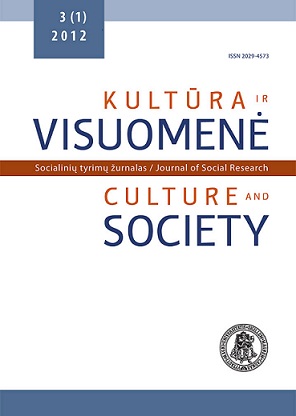The Influence of Reconciliation of Work and Family on the Lithuanian Population’s Childbearing Intentions
The Influence of Reconciliation of Work and Family on the Lithuanian Population’s Childbearing Intentions
Author(s): Giedrė Purvaneckienė, Artūras TereškinasSubject(s): Cultural Essay, Political Essay, Societal Essay
Published by: Vytauto Didžiojo Universitetas
Keywords: reconciliation of work and family; fertility; childbearing intentions; gender; gender equality; darbo ir šeimos derinimas; gimstamumas; prokreaciniai ketinimai; lytis; lyčių lygybė
Summary/Abstract: Bandydamos išspręsti gimstamumo problemas, daugelis šalių iškelia darbo ir šeimos, darbo ir asmeninio gyvenimo suderinimo klausimus. iš pagrindinių priemonių, galinčių teigiamai paveikti gimstamumą, daugelis mokslininkų išskiria finansinį skatinimą (išmokas, mokesčių nuolaidas ir pan.), paramą tėvams, siekiantiems derinti darbą, šeimos ir laisvalaikį bei įvairias socialines struktūras, remiančias vaikus ir tėvystę (užimtumo skatinimą, vaikui palankią aplinką ir pan.). Pastaruoju metu, kaip rodo tarptautiniai tyrimai ir viešosios politikos dokumentai, prioritetine tapo darbo, šeimos ir laisvalaikio derinimo kryptis, integruojanti užimtumo, šeimos ir lyčių lygybės politiką. Šio straipsnio tikslas – išsiaiškinti lietuvos gyventojų darbo, šeimos ir laisvalaikio deri- nimo ryšius su ketinimais turėti vaikų. Straipsnis remiasi reprezentatyvia reproduktyvaus amžiaus lietuvos gyventojų (n=1031) apklausa, atlikta 2010–2011 m. analizei buvo panaudotas 26 klausimų blokas apie darbo–šeimos–laisvalaikio konflikto santykį su gyventojų prokreaciniais ketinimais. atlikta gautų duomenų analizė tik iš dalies patvirtino hipotezę: kuo didesnis darbo–šeimos–laisvalaikio konfliktas, tuo mažesni respondentų ketinimai turėti (daugiau) vaikų; ir šis ryšys moterims turėtų būti stipres- nis. Buvo nustatyti tik du hipotezę visiškai atitinkantys statistiškai reikšmingi ryšiai tarp darbo–šeimos–konflikto ir vaikų turėjimo ketinimų. Vienas iš ryšių – priešingos krypties nei hipotezėje: kuo labiau darbas trukdo šeimai ir laisvalaikiui, tuo labiau didėja tikimybė, kad vyras (o per artimiausius trejus metus – ir moteris) ketins turėti (daugiau) vaikų. Kodėl ši hipotezė pasitvirtino tik iš dalies? Using a wide array of theoretical and empirical studies and a national public opinion survey of Lithuanians (N=1031) of the reproductive age (18–45 y. o.) conducted in 2010–2011, within the framework of the project “Gender Inequality, Public Policy and the Future of Fertility in Lithuania,” the article examines the issue of work-life reconciliation in relation to women and men’s intentions to have children. The hypothesis was raised that the stronger conflict the respondents experience between work, family life and leisure, the less they intend to have children or more children in the future. However, the assumption that the childbearing intentions of individuals able to reconcile their work and family will be stronger than the childbearing intentions of those who do not manage to resolve the issue of work-family reconciliation was confirmed only partially in this analysis. One of the statistically significant relationships was opposite to the raised hypothesis: the more work interfered with family and leisure, the more probable that respondents (both men and women) ever intended to have more children. In explaining this statistically significant relationship, it is necessary to keep in mind the economic situation in Lithuania.
Journal: Kultūra ir visuomenė: socialinių tyrimų žurnalas
- Issue Year: III/2012
- Issue No: 1
- Page Range: 51-67
- Page Count: 17
- Language: English

